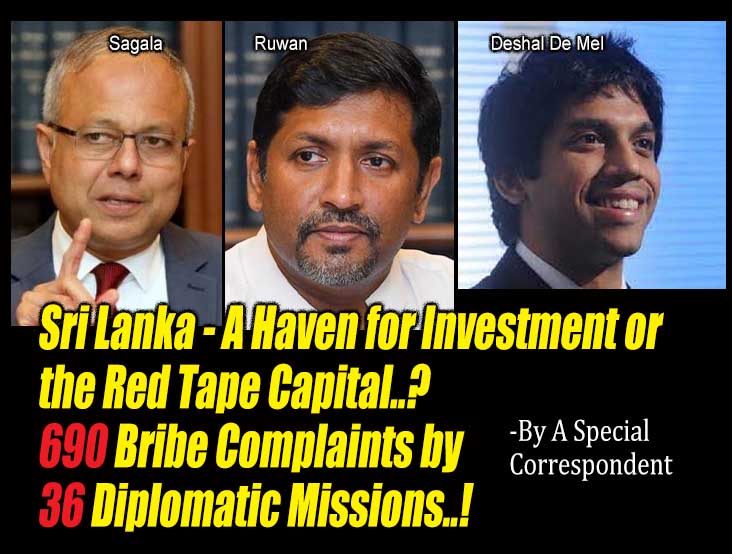-By A Special Correspondent

(Lanka-e-News -21.Jan.2024, 8.20 PM) Sri Lanka, with its picturesque landscapes and promising economic prospects, has been touted as an attractive destination for foreign investors. However, a closer inspection reveals a labyrinth of bureaucratic hurdles and corruption that has left investors questioning the feasibility of investing in this island nation. This investigative report aims to delve into the systemic issues surrounding investment processes, highlighting red tape, corruption, and intimidation tactics employed against investors.
The journey for investors in Sri Lanka begins with an arduous application process, navigating through numerous government entities. The Export Development Board, Provincial Council, local government offices, and over 20 other departments must all grant approvals. The exhaustive list includes Ministries, Treasury, Sri Lankan Customs, Excise Department, and even the Presidential Secretary's office. The final blow comes in the form of 49 different entities demanding both approval fees and, allegedly, bribes, creating an intricate web of red tape.
President Ranil Wickramasinghe's administration faces scrutiny as well-known business leaders question the abundance of red tape. President's advisor Ruwan Wijewardhana and Chief of Staff Sagala Rathnayaka, along with Deshal De Mel, are accused of demanding bribes to expedite investment projects. Diplomats have raised concerns over the misuse of official capacities to hinder applications if bribes are not paid, casting a shadow over the legitimacy of the investment process.
Chinese investors, often seen as a lifeline for Sri Lanka's economic growth, have become victims of corruption. Past and present ministers allegedly demand bribes from Chinese investors, prompting the Chinese Embassy in Colombo to publicly expose the issue. The Chinese government's frustration with ongoing red tape, manipulated by Sri Lankan ministers seeking bribes, poses a significant threat to the bilateral investment relationship.
A shocking incident involving the assault of an Omani investor raises questions about the safety of foreign entrepreneurs in Sri Lanka. The Managing Director of an apparel factory faced a brutal attack, allegedly orchestrated by a gang backed by a politician in the Gampaha District. This disturbing incident has led the Omani businessman to close down his factory, highlighting the real and immediate threats faced by foreign investors.
Sri Lanka's anti-graft agency, the Commission to Investigate Allegations of Bribery or Corruption (CIABOC), has arrested President Maithripala Sirisena's chief of staff and another state official on suspicion of accepting a bribe. The arrests further expose high-level corruption, creating a crisis of confidence in the government's commitment to clean governance.
Alarming revelations suggest that every parliamentarian in the Sri Lankan Parliament can be hired as a consultant for foreign investment projects. This questionable practice involves promises of approval from ministers, followed by additional bribes demanded by various officials within the ministry. With 690 complaints received by 36 diplomatic missions, the involvement of parliamentarians in corruption becomes a critical issue.
Explosive allegations claim that the Sri Lankan Board of Investment operates like a mafia organization. Monthly bribes are allegedly collected from apparel manufacturers and other firms within the free zone. Notable companies such as MAS, Body Line, and Hydramani are implicated in paying off BOI directors, managers, and the Industrial Minister. This not only violates Sri Lankan law but also puts major exporters at risk of being banned by the USA, UK, and Europe.
Major exporters in Sri Lanka are accused of building a cartel, paying off politicians and corrupt officials to secure a monopoly on export quotas. An investigation into Ashroff Omar, a non-Sri Lankan origin businessman, reveals attempts to discourage new investors by holding the majority of the export quota through political payments. This disturbing trend has caught the attention of international authorities.
As Sri Lanka endeavors to attract foreign investments, the findings of this investigation paint a grim picture. Red tape, corruption, assaults on investors, and arrests of high-ranking officials collectively create an environment that raises serious doubts about Sri Lanka's standing as an ideal place to invest. Urgent reforms and international scrutiny are imperative to cleanse the system, restore investor confidence, and uphold the principles of fair and transparent governance. Until these issues are addressed, the question remains: Is Sri Lanka truly a haven for investments, or has it become the red tape capital, deterring potential investors from its shores?
---------------------------
by (2024-01-21 15:06:21)
Leave a Reply